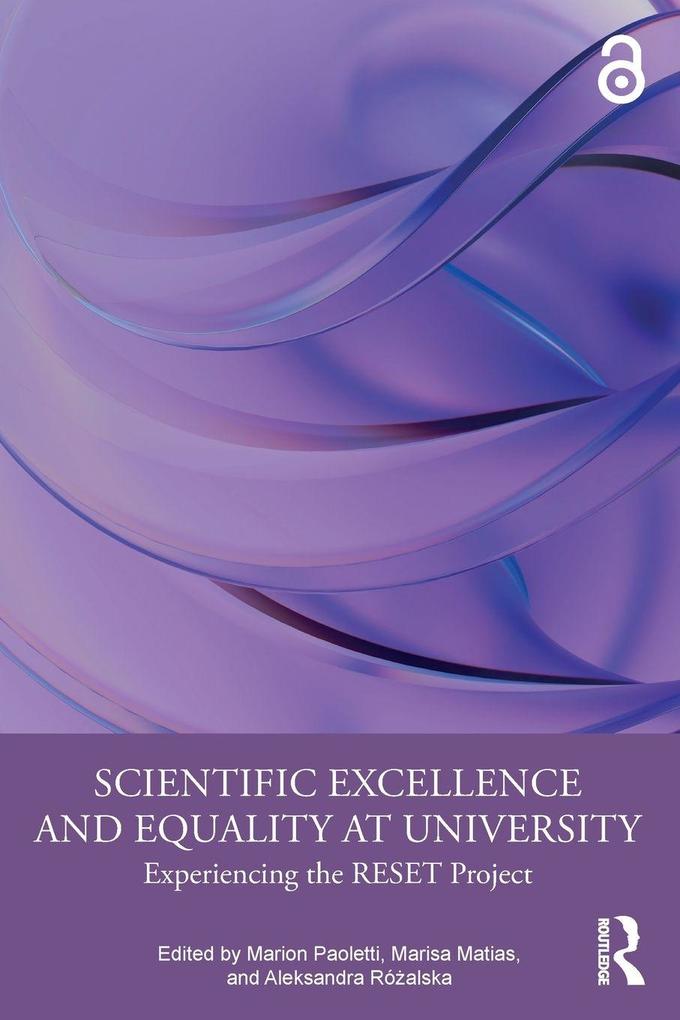Bücher versandkostenfrei*100 Tage RückgaberechtAbholung in der Wunschfiliale

Zustellung: Mo, 13.10. - Sa, 18.10.
Versand in 3-4 Wochen
VersandkostenfreiBestellen & in Filiale abholen:
Based on the EU-funded project RESET (Redesigning Equality and Scientific Excellence Together) and written by members of seven European partner universities representing different disciplines, this book combines theory and practice to discuss and reflect on the concept of scientific excellence within higher education. It considers the pitfalls and the need to revisit an understanding of inclusivity by asking how scientific excellence and professional equality can be made compatible in practice.
Split into three key sections, the first part of the book is devoted to the question of scientific excellence in relation to existing gender inequalities within universities. It includes a discussion on the objectivity of scientific excellence based on feminist literature devoted to the reproduction of inequalities in universities and data collected during the RESET project. The second part is dedicated to the actions taken to achieve more inclusive excellence and the third part finishes by focussing on training on gender and diversity issues and the resistance that such workshops generate.
The book offers a comprehensive guide to fostering an academic culture that aligns scientific excellence with equality, diversity, and inclusion, providing researchers and decision-makers alike with practical tools for achieving inclusive excellence within European universities, while at the same time knowing how to deal with difficulties and resistance.
Split into three key sections, the first part of the book is devoted to the question of scientific excellence in relation to existing gender inequalities within universities. It includes a discussion on the objectivity of scientific excellence based on feminist literature devoted to the reproduction of inequalities in universities and data collected during the RESET project. The second part is dedicated to the actions taken to achieve more inclusive excellence and the third part finishes by focussing on training on gender and diversity issues and the resistance that such workshops generate.
The book offers a comprehensive guide to fostering an academic culture that aligns scientific excellence with equality, diversity, and inclusion, providing researchers and decision-makers alike with practical tools for achieving inclusive excellence within European universities, while at the same time knowing how to deal with difficulties and resistance.
Inhaltsverzeichnis
Introduction
Part I: Issues of compatibility
Chapter 1 - Pat O'Connor
Is scientific excellence a gendered construction?
Chapter 2 - Maxime Forest
Towards inclusive excellence policies at European level?
Chapter 3 - Marion Paoletti
Scientific excellence and equality: The perspectives of university personnel in four European countries (Greece, France, Poland, and Portugal)
Chapter 4 - Ninon Junca
RESET's Commitment to Inclusive Scientific Excellence: Mobilising Governance and Including New Indicators
Part II: Mobilisation and resistance
Chapter 5 - Netta Iivari, Eva Durall Gazulla, Ruut Tikkanen
Co-cultivating co-design for gender equality in the context of higher education institutions
Chapter 6 - Marisa Matias, Sara Isabel Magalhães, Jorge Peixoto Freitas, Alexandra Lopes, Conceição Nogueira, Maria Isabel Dias
A new generation of GEPs: How academic organisations address equality, intersectionality, and diversity
Chapter 7 - Maria Michali, Areti Ampatzoglou, Eleni Karachaliou, Kalliopi Malerou, Stelios Karamanidis, Lamprini Argyropoulou, Dimitra Hadjipavlou-Litina, Athina Vakali
The challenges of diversity and equality data in academic and research organisations
Chapter 8 - Viktoria Niebel
Gender-inclusive communication in academic organisations: a lever for change
Part III: Bringing about cultural change
Chapter 9 - Agata Rudnicka, Aleksandra Ró¿alska
From training to organisational change: The role of stakeholder engagement in education on gender equality and diversity in higher education institutions
Chapter 10 - Mateusz Hauk, Paulina Szymäska
The Role and Actions of a Trainer in Conducting Training and Workshops on Diversity and Gender Equality at Universities
Chapter 11 - Mervi Heikkinen
Mainstreaming Intersectional Gender Impact Assessment in Higher Education Institutions' Knowledge Production - Transforming Research and Education from Within
Chapter 12 - Tuija Lämsä
The Constellation of CoPs as Gender Change Agents: The Meaning of Communities of Practitioners Now and in the Future
Part I: Issues of compatibility
Chapter 1 - Pat O'Connor
Is scientific excellence a gendered construction?
Chapter 2 - Maxime Forest
Towards inclusive excellence policies at European level?
Chapter 3 - Marion Paoletti
Scientific excellence and equality: The perspectives of university personnel in four European countries (Greece, France, Poland, and Portugal)
Chapter 4 - Ninon Junca
RESET's Commitment to Inclusive Scientific Excellence: Mobilising Governance and Including New Indicators
Part II: Mobilisation and resistance
Chapter 5 - Netta Iivari, Eva Durall Gazulla, Ruut Tikkanen
Co-cultivating co-design for gender equality in the context of higher education institutions
Chapter 6 - Marisa Matias, Sara Isabel Magalhães, Jorge Peixoto Freitas, Alexandra Lopes, Conceição Nogueira, Maria Isabel Dias
A new generation of GEPs: How academic organisations address equality, intersectionality, and diversity
Chapter 7 - Maria Michali, Areti Ampatzoglou, Eleni Karachaliou, Kalliopi Malerou, Stelios Karamanidis, Lamprini Argyropoulou, Dimitra Hadjipavlou-Litina, Athina Vakali
The challenges of diversity and equality data in academic and research organisations
Chapter 8 - Viktoria Niebel
Gender-inclusive communication in academic organisations: a lever for change
Part III: Bringing about cultural change
Chapter 9 - Agata Rudnicka, Aleksandra Ró¿alska
From training to organisational change: The role of stakeholder engagement in education on gender equality and diversity in higher education institutions
Chapter 10 - Mateusz Hauk, Paulina Szymäska
The Role and Actions of a Trainer in Conducting Training and Workshops on Diversity and Gender Equality at Universities
Chapter 11 - Mervi Heikkinen
Mainstreaming Intersectional Gender Impact Assessment in Higher Education Institutions' Knowledge Production - Transforming Research and Education from Within
Chapter 12 - Tuija Lämsä
The Constellation of CoPs as Gender Change Agents: The Meaning of Communities of Practitioners Now and in the Future
Produktdetails
Erscheinungsdatum
16. September 2025
Sprache
englisch
Seitenanzahl
206
Herausgegeben von
Aleksandra Rozalska, Marion Paoletti, Marisa Matias
Verlag/Hersteller
Produktart
kartoniert
Gewicht
453 g
ISBN
9781032916484
Entdecken Sie mehr
Bewertungen
0 Bewertungen
Es wurden noch keine Bewertungen abgegeben. Schreiben Sie die erste Bewertung zu "Scientific Excellence and Equality at University" und helfen Sie damit anderen bei der Kaufentscheidung.









